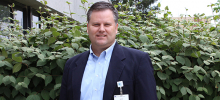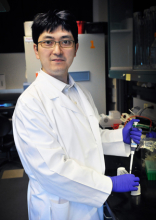Anatomist and Students Present Findings at National Conference
ANATOMIST AND STUDENTS FROM UK CENTER OF EXCELLENCE IN RURAL HEALTH PRESENT RESEARCH FINDINGS AT NATIONAL CONFERENCE
HAZARD, Ky. (Aug. 1) – Findings of research conducted by Dr. Charles Marshall and doctoral students at the University of Kentucky College of Health Sciences Department of Physical Therapy were presented at the 31st Annual Meeting of the American Association of Clinical Anatomists in Orlando, FL, July 8-12.
Medical Student Named Recipient of Dickerson Scholarship
Ashtin Nix, a fourth-year medical student, was recently named the recipient of the Charles G. and Edith J. Dickerson Scholarship. Ashtin was selected from among students nominated from each of the six UK health profession colleges based on demonstrated academic excellence, financial need, and practice interest in an underserved area in Kentucky. Ashtin is a part of the College of Medicine Rural Physician Leadership Program. For this honor, she will receive a $5,000 award.
NIH Awards Prestigious "Pathway to Independence Award"
Community Leadership Institute of Kentucky to Begin in Fall 2014
The Community Leadership Institute of Kentucky (CLIK) is a new 3-week leadership development training program scheduled to begin this fall. It is offered by the UK Center of Excellence in Rural Health (CERH), the Kentucky Office of Rural Health, and the UK CCTS Community Engagement and Research Program. The CLIK is designed to enhance community research and capacity-building competencies in community leaders (e.g., directors, administrators, and other persons who play a key role in using data and decision making).
UK Psychologist Creating Online Tool to Help Patients Navigate Lung Cancer Screening Decision
Federal Guidance Changes are Coming
The Federal Office of Management and Budget (OMB) took 8 separate circulars applicable to different types of grantee organizations and combined them into a single document referred to as the Uniform Guidance. Much remains that looks familiar but there is the potential for both major and minor changes to our policies and procedures. To further complicate matters, the OMB document is actually guidance to federal agencies and each granting agency must issue its own implementing regula



